Regional campuses find ways to stay engaged, relevant
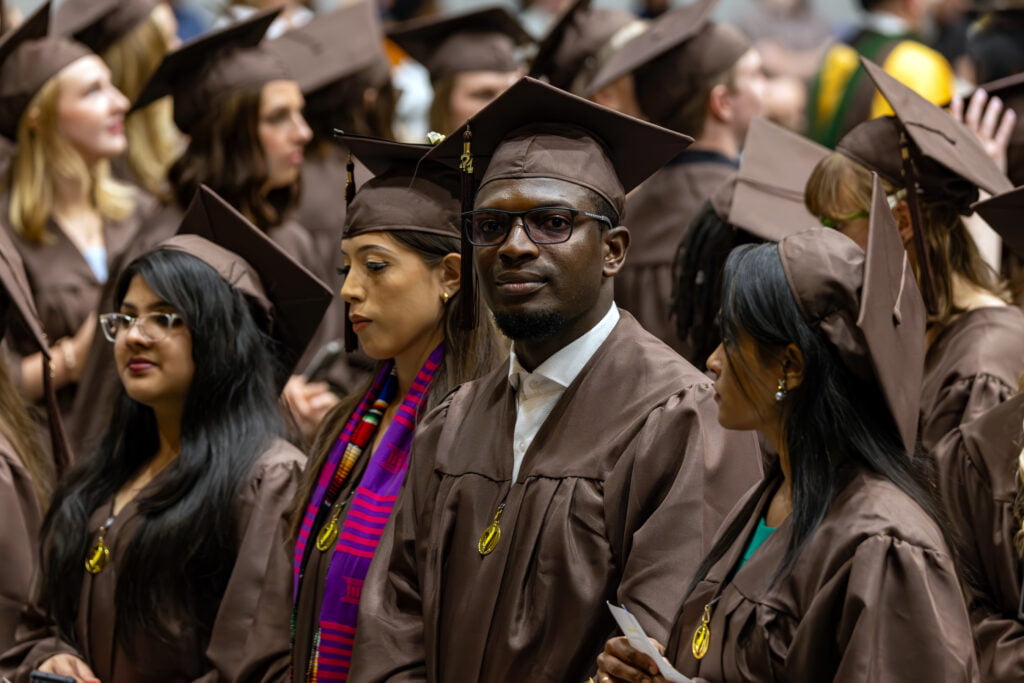
Higher education, though many believe serves a noble goal, is still a business. Institutions today face numerous challenges, from declining enrollment to talent attraction.
Despite these uncertainties, colleges and universities in the Region have found ways to stay relevant to the business community and create economic impact.
The Indiana Commission for Higher Education reported that enrollment in the state last fall was up by about 4,700 students from 2022 — particularly at two-year institutions. Enrollment for students seeking a two-year degree at Ivy Tech Community College’s Lake County campus was up by 12.5% from 2022.
Through partnerships and programming, regional colleges are positioning themselves as active, engaged and relevant community members.
Shaping the Region
Several campuses have adopted a multi-pronged approach to closing gaps in the workforce.
Purdue University Northwest is among them, according to Chancellor Chris Holford.
PNW contributes to the regional economy and plays a major role in the transformational changes affecting businesses and area populations, Holford said. PNW leads the charge in terms of innovations that are shaping the Region’s future in key sectors, including steel, power, health care and mental health.
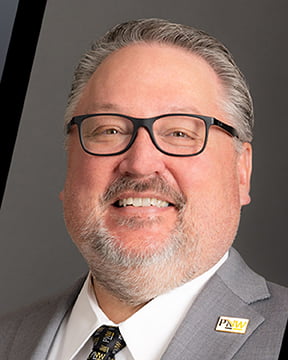
“For example, PNW’s Center for Innovation through Visualization and Simulation is a longtime partner to regional steelmakers for implementing solutions for energy efficiency,” Holford said. “Within the last three years, the U.S. Department of Energy has awarded more than $24 million in grants to CIVS and regional partners for cutting-edge steel decarbonization research to reduce carbon emissions.”
Holford said his institution is committed to bolster workforce development in other ways too. PNW’s academics are evaluated so that program curricula and hands-on experiences reflect the evolving needs of employers in Northwest Indiana.
“In recent years, we have seen the need for well-prepared graduates in areas such as cybersecurity, technology and mental health care,” he said. “Some of PNW’s recently introduced programs include a bachelor of science in cybersecurity and a doctor of technology applied doctoral program. We look forward to welcoming the first cohorts of students to our new doctor of psychology applied doctoral program and master of science in psychology in fall 2024.”
The university plans to offer more options too.
“PNW also recently earned approval from the Indiana Commission for Higher Education for a master of social work program that is expected to start enrolling in 2025,” he said.
Valparaiso University is another institution that strives to serve students in the working world. Leaders launched a master of social work, which will begin part time online in the fall and full time in person in summer 2025.
“Faculty have wanted the MSW program for a long time, and I am excited we can now realize that dream for our students and community,” said Caroline Ban, program director and assistant professor in the university’s social work department, in a press release. “Students will be challenged and supported as we prepare passionate leaders to serve and practice at the forefront of social change.”
Porter-Starke Services leaders are excited about the launch of the program. They have a longtime partnership with the university.
“For years we have benefited from the excellent skills the BSW graduates possess that sets them apart from other recent graduates,” said Sandra Carlson, vice president for clinical service at Porter-Starke Services, in a press release.
Sam Burgett earned her bachelor’s degree in social work from Valparaiso University in 2020. She now is a social worker at the Porter County sheriff’s office.
“Valpo’s program is unique in that it pushes students to have real-world experiences early on and to begin applying what they learn in the classroom to their work in a way that is different from most other schools,” she said in the statement.
Data drives decisions
The majority of PNW’s core undergraduate population (85%) is enrolled full time, according to Holford. This data point has informed their approach to cultivating the built environment on campus.
“PNW has invested in spaces and resources that meet students’ needs, as many spend most of their day on campus,” he said. “From open-concept study and collaboration areas in the state-of-the-art Nils K. Nelson Bioscience Innovation Building to the recently renovated Mane Zone student collaborative space in one of our primary classroom buildings, we are intentional about fostering students’ academic excellence and providing them with physical spaces to enjoy a high-quality, engaging on-campus experience.”
Ivy Tech, on the other hand, has more student commuters, so it offers vouchers for round-trip Uber rides on Tuesdays. The University of Saint Francis is trying to attract parents as a way to recruit and retain students. A $65,700 federal grant awarded last fall will bring child care centers to its Crown Point location.
University officials also are considering emerging demographic trends to increase the chance of student success.
According to Holford, PNW is one of the most diverse Midwest regional institutions. Therefore, the campus reflects the communities it serves.
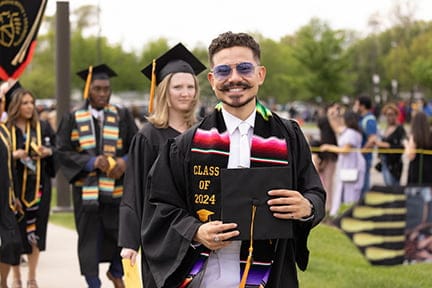
Some statistics drive this narrative. More than 25% of PNW students self-identify as Hispanic or Latino, and more than 11% of students self-identify as Black or African American, Holford said. PNW also welcomed international students from 50 countries and saw a 43% increase in international student enrollment.
PNW has increased efforts to become more inclusive. Following official designation by the U.S. Department of Education this year, PNW will be the largest public Hispanic-Serving Institution in Indiana. HSIs are colleges or universities that have at least 25% of their full-time undergraduate students identifying as Hispanic or Latino. This designation is given by the U.S. Department of Education, which also provides grants and funding to support HSIs improve their academic quality and institutional stability.
According to Holford, PNW serves the most Latino college students in Northwest Indiana, so this presents an opportunity to better cater to an often underserved population.
“To help best serve current and prospective Latino students, some of PNW’s initiatives include the establishment of an office and director of Hispanic-Serving Institution Initiatives; bilingual recruitment materials and community outreach; professional development opportunities through PNW’s HSI office and the Hispanic Association of Colleges and Universities; and on-campus experiences celebrating Latino students and cultures,” Holford said.
Empowering working students
Holford said decision-makers at PNW have explored other ways to find connection points between the student population and the real world.
For example, the college recently started a cohort model in the College of Technology in collaboration with industry in Northwest Indiana. It will help meet the demand for development opportunities in the working adult population. The cohort model provides an opportunity for employees to hone their skills as a group and finish their degrees, he said. The result is a win-win in that employees gain skills that help employers meet their goals.
Other universities also are making these kinds of decisions.
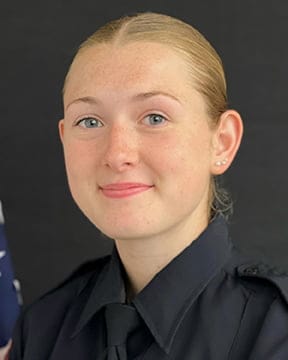
Indiana University Northwest’s Taylor VanDommelen was on track to graduate in May with a bachelor’s degree in criminal justice. She is part of an accelerated program that allowed her to already begin work on her master’s degree in public administration. She’s expected to complete her master’s degree by May 2025.
The university also provided her with the opportunity to join its 50th annual Police Academy. She earned the distinction of the top-scoring female recruit on the academy physical fitness test for the 50th class. She also works for the IU Police Department-Northwest.
These academic and real-world experiences helped her land a job in her field before completing her undergraduate degree.
Raised in Northwest Indiana, VanDommelen attended Highland High School. After graduation, she enrolled at South Suburban College and then transferred to IUN to earn her bachelor’s degree. It was important to her to be close to home, so IUN proved to be a good fit. She plans to stay in Northwest Indiana after graduation and hopes to eventually become a federal agent.
VanDommelen said IUN’s academic programs prepared her for the workforce. She said the variety of coursework helped round out the program. She was also impressed by the faculty, their professional backgrounds and how they enhanced learning. Specifically, she said her professors have done a masterful job of translating classroom concepts to the real world.
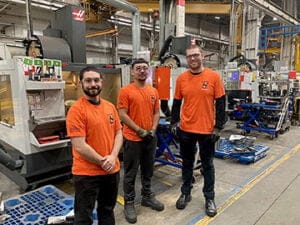
“I would say there are some parallels, not necessarily when it comes to police work per se, but (developing) a better understanding of the kind of people you’re dealing with,” she said. “Understanding (all the factors that affect) policing helps you perform your job better.”
Ivy Tech Community College’s Lake County campus in East Chicago also helps match qualified graduates with employers. Toyota Material Handling’s heavy-duty division in East Chicago has aligned with the campus to recruit talent. Human Resources Manager Christine Lewis said the company has found success hiring students by visiting the campus and attending career fairs. This tactic has helped them add qualified people to their payroll.
“About half of our machining department has had schooling from Ivy Tech, which has given them the skillset to be a great asset to our company,” she said. “Their skillset has helped us grow tremendously and many of them would attribute that to Professor (Philip) Bryant, who is fantastic! We look forward to a continued partnership with Ivy Tech in helping their students find employment with us!”
Focus on entrepreneurship
Indiana University Northwest’s Jana Szostek wears many hats, but the common thread is making sure students, faculty and community members are equipped to meet the demands of the 21st century regional economy. As director of the Business Academy in the Center for Professional Development, she acts as a liaison between the small business community and the university.
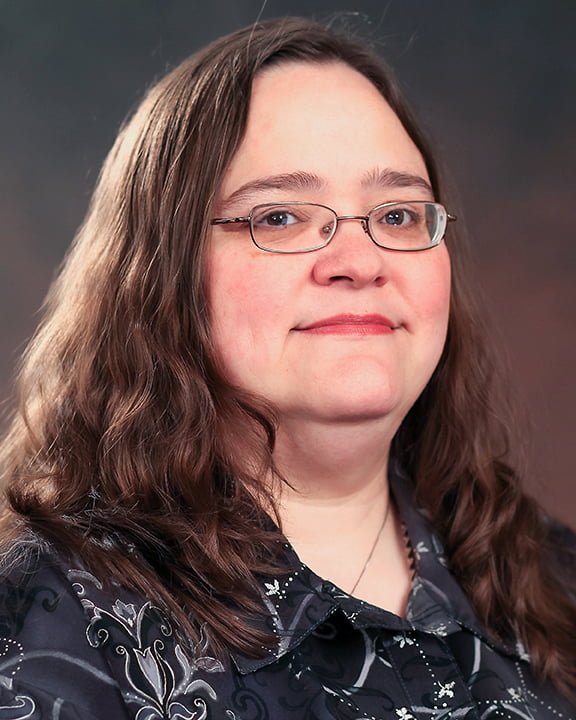
The Business Academy provides resources free of charge to local entrepreneurs and small business owners. For instance, Szostek said they offer a speaker series, on-site workshops and a business clinic that provides a forum for business builders to gain knowledge and practical insights to support growth.
“In the last year, we’ve worked with about 90 small business owners and helped them to fine-tune their business plan, taught them things about accounting, bookkeeping, marketing, legal issues, insurance — all those types of things that a business owner would need to know,” she said.
From a qualitative standpoint, Szostek said the Business Academy programming has resonated with the small business community.
“They’re all very appreciative of being able to get that information,” she said. “It’s almost overwhelming for them. When they’re brand new to starting a business, they come in and (there’s a lot of information to process.) But it’s free information for them, and they walk out of there feeling really empowered to do what they want.”
Another way the Business Academy fulfills its mission is by offering consulting services. Staff can help business owners and entrepreneurs make better decisions and effectively act upon those decisions. Recent examples of their work include executive selection and coaching, management training, stakeholder surveys, employee manual development, job analysis, and strategic marketing and social media planning.
The Business Academy’s impact extends beyond the confines of the entrepreneurial community, however. According to Szostek, IUN faculty and staff interact with community organizations. For instance, they volunteer with local chambers of commerce and in economic development roles.
“Being engaged with a lot of those organizations (means) we have higher education represented in those conversations,” she said.
Betting on the future
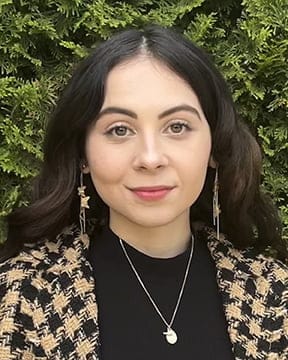
PNW student Mya Bell is no stranger to community development work. She’s pursuing a double major in human development and family science and political science.
A native of the Region, she’s also a first-generation college student. Although she didn’t realize the weight of this distinction at first, in retrospect, she said it guided her school selection process. PNW made higher education accessible, and the natural choice due to its proximity to her hometown, affordability and shared sense of values.
“Every time I’ve done something through the school, like planning a service activity or event for the students or the community, I’ve gotten to collaborate with a lot of awesome community leaders and professionals,” she said. “Working with them has (been such a) good (source of) inspiration and role models.
“For me, becoming a professional in Northwest Indiana means I have a commitment to PNW to serve my community, like they have instilled in me. You can’t really make the world a better place until you make your community … a better place.”
Read more stories from the current issue of Northwest Indiana Business Magazine.

